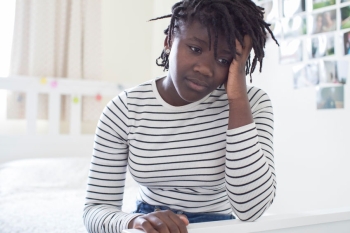
The uncertainty of COVID-19 has created anxiety for many people. COVID-19 changed many of our routines and daily life almost overnight which creates anxiety for many. While anxiety is a reasonable response to COVID-19 and its uncertainty, what if you are the type of person that craves certainty and experiences a lot of catastrophizing anxiety thoughts?
A need for certainty in an uncertain situation can create increased anxiety and in some people can create a lot of anxious catastrophizing thoughts. Your mind may try to convince you that going over and over those thoughts will help you to find certainty and feel safe. In reality, all it does is create more anxiety. This tip will address how to manage these anxious catastrophizing thoughts so that they don’t manage you and create more anxiety.
Step 1: Try to recognize the anxious thoughts when they occur. Often anxious thoughts swirl around quickly without us even noticing. Try to isolate the anxious thought that reoccurs. Here’s an example:
What if COVID-19 goes on for months and I can’t leave the house?
Step 2: Ask yourself: Is this worry productive or unproductive? Productive worry is something that you can make a plan to address. Unproductive worry are things that are out of your control. Worrying about them is not useful or helpful. If we look at the above example, the statement is an unproductive worry. You can’t control the COVID-19 virus or how long we will need to stay home. But let’s pull this worry apart a bit. Ask yourself what concerns you about it going on for months and needing to stay home. Is it that you are bored and isolated and want social interaction? Is it fearing a loss of your job? Loss of money? With each of your concerns, is there a plan of action that you can take? If there is a plan of action, that is a productive worry and it is useful to make a plan and execute it. For example, If you are worried about finances, look at your budget. Where can you trim costs? Do you have any support that can help you financially? Are there any ways you can make money? Are there any government benefits for which you are eligible? Do some work in researching the different benefits that may be available for your mortgage/rent, utilities, etc. As this crisis unfolds, more programs and options are available to help with living expenses.(Please see our homepage for a link to different types of resources). Again, If you have a productive worry, do some research and make a plan of action.
Step 3: Now that you are working on addressing productive worries, what should you do with those unproductive worries. These worries are a little more challenging to manage but if you keep practicing it will get easier. Whenever an unproductive worry pops in your head, acknowledge it as a unproductive worry and then distract yourself with other non worrisome thoughts, or distract yourself with an activity that takes your attention (it is recommended that you make a list of different activities so that when you experience this type of worrying, you have a list of activities that you can grab to try).For example, your list may include watching a movie, reading a book, talking to a friend, spending time doing an activity with your spouse and/or family, talking a walk, playing with your dog, etc. The thought may keep entering again and again and expect it. Try to stay calm about it entering your mind and remind yourself that it is just a thought and that there is nothing you can do to address or control the thought or situation. The trick is to stay on top of distracting yourself and staying in the moment rather than engaging with the thought. This is a simple mindful technique but it can be challenging. Sometimes it is helpful to talk it out with a friend but keep in mind that the more attention you give the thought, the more your mind will think it needs to pay attention as a solvable problem.
COVID-19 is a scary event and many of us are having anxious thoughts. The problem is when the anxious thoughts happen all the time and cause high levels of anxiety. When this happens, you can intervene to manage how you engage in the thoughts and as a result manage your anxious feelings. If you need more assistance, call 215-922-5683 x 100 to make an appointment with one of our therapists.




















